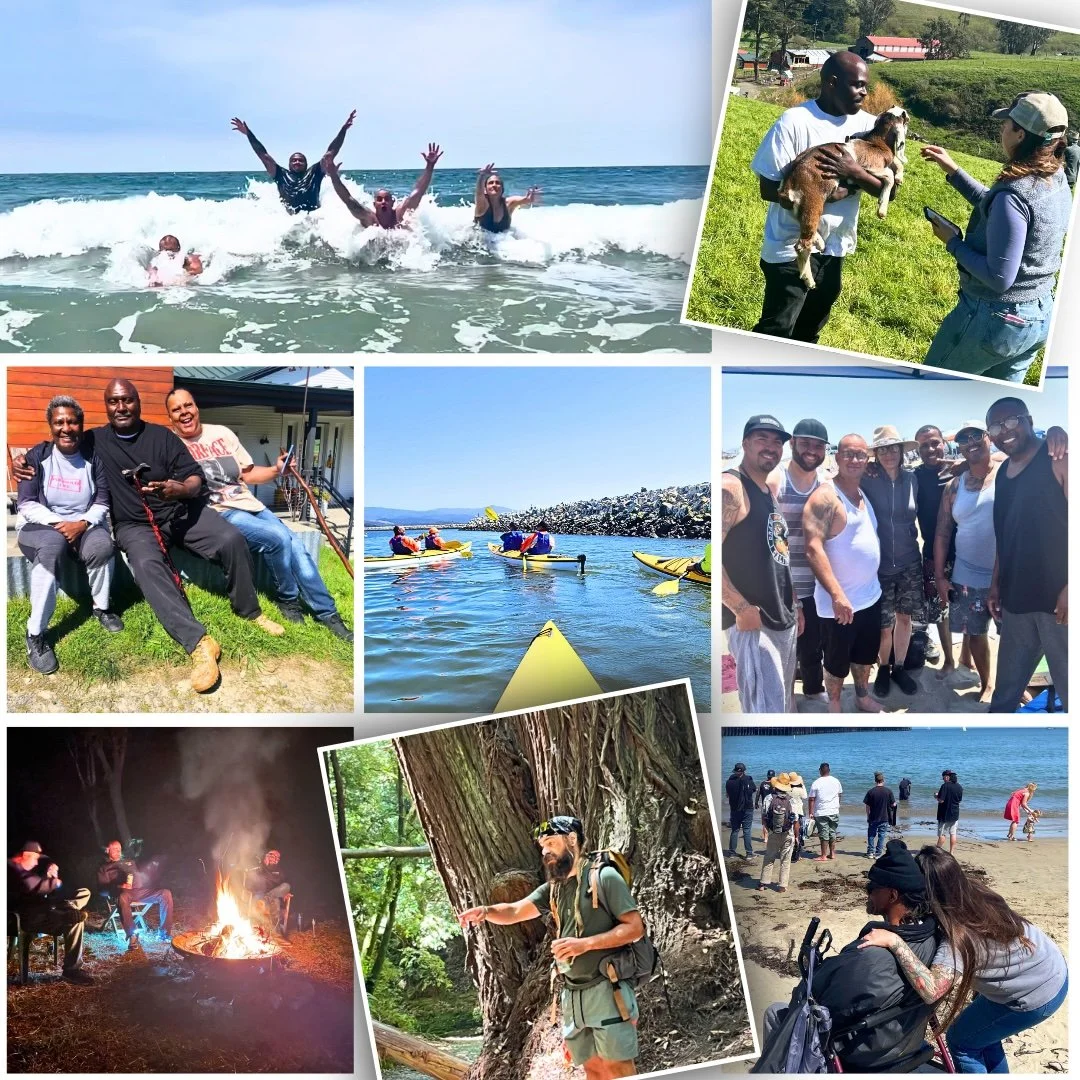The Healing Power of Nature: LT’s Ecotherapy Model
This past weekend, Land Together hosted a camping trip in Santa Cruz for reentry participants and their families, many of whom were camping for the very first time. Highlights included spotting wildlife such as deer, coyotes, quails, lizards, and gophers; hiking through The Forest of Nisene Marks State Park; and building friendships and community around bonfires.
The camping trip was the latest in our series of monthly community-building and healing excursions for reentry participants. These outings are one of the primary ways we continue to engage participants in ecotherapy, a core element of our in-prison programming.
In recent years, ecotherapy, also known as nature therapy or green therapy, has gained attention as a powerful tool for mental and emotional well-being. There is a growing body of scientific evidence demonstrating how contact with the natural world supports healing for depression, anxiety, and PTSD. For incarcerated and formerly incarcerated individuals, the benefits of connecting with nature are particularly profound.
What is Ecotherapy?
Ecotherapy involves guided experiences in natural settings such as gardens, forests, or parks, and includes activities like gardening, walking in nature, practicing mindfulness outdoors, and wilderness programs. It’s rooted in the understanding that humans have an innate connection to the natural world, and that restoring this connection can support healing.
Mental health and incarcerated people
In the US, jails and prisons have become de facto mental health institutions, with more than 70% of people incarcerated having at least one diagnosed mental illness or substance use disorder and with people with mental illnesses being 10 times more likely to be incarcerated than they are to be hospitalized.
Prisons as a contributing factor to mental illness
Prisons are traumatic, dehumanizing, and isolating environments that cause and exacerbate mental health challenges. Most prisons are stark, institutional environments dominated by concrete and metal, with little to no access to green or natural spaces. This disconnection from nature is one of many factors that can contribute to the mental health challenges faced by incarcerated individuals.
Benefits of LT gardens inside prisons
Introducing elements of nature, whether through gardening programs or simply access to green spaces can significantly reduce anxiety, depression, and PTSD symptoms. Studies show that nature exposure can lower cortisol levels and improve emotional regulation, offering a crucial outlet in an environment where mental health support is extremely limited. Participants tell us time in the gardens offer them both a sense of peace and a sense of freedom.
As one participant at San Quentin shared, “Being out in the garden brings back memories of my childhood. It’s a bit of freedom. All the constraints and stressors of the routine here are gone. It’s fun to get our hands in the dirt, smell the flowers, hear the buzzing of a bee. That’s something that we all need to thrive, and to feel alive.”
Growing More Than Plants
Land Together’s permaculture and landscape design training do more than teach vocational skills—they cultivate hope. Participants consistently report increased self-esteem, reduced stress, and a renewed sense of connection to something greater than themselves.
One participant at Central California Women’s Facility shared: “I now look at life in a whole new way. I now ask what can I do. I see how I am a lot like a plant, a lot of similarities. I love this class. I value nature so much more now. I see the damage humans are doing to our home and I’d like to do something about it. I want to grow and eat my own veggies. I have ‘new eyes’ to the world around me. I want to pass on what I have learned to others.”
Benefits in Reentry
For people reentering society after incarceration, ecotherapy can ease the transition by offering healing and support. Our participants face overwhelming challenges, including securing stable housing, finding employment, accessing healthcare, rebuilding family relationships, and confronting the stigma of incarceration. Nature-based programs provide a refuge from daily stressors, foster connection with others who share similar experiences, and help restore a sense of purpose. They also support long-term success by building emotional resilience, self-efficacy, and healthy coping skills, ultimately reducing the risk of recidivism.
A participant shared this reflection after a recent reentry excursion to Toluma Farms and Dillon Beach: “This trip was my mecca. As the waves crashed from the ocean, the past pain left with the winds of emotions. Learning to nurture, the healing needed & necessary. Come by the blessings of education from baby lambs. This trip changed my life.”
A Path Forward
Ecotherapy programs for incarcerated and formerly incarcerated people remain rare, but at Land Together, we’ve seen firsthand the powerful impact they can have. Ecotherapeutic activities tap into a deep, often overlooked connection between people and the natural world—a connection that is especially restorative for those who have experienced trauma, isolation, or systemic disconnection. As we continue to grow and sustain our ecotherapy programs inside prisons and throughout reentry, Land Together is also committed to championing ecotherapy as tool for transformation, and to advocating for greater understanding and investment in its potential.
In community,
Karen Hseuh
Interim Executive Director


